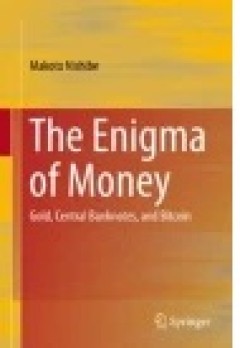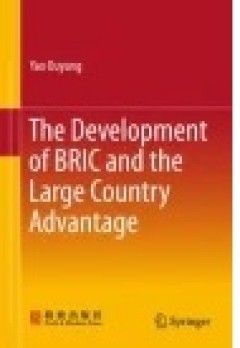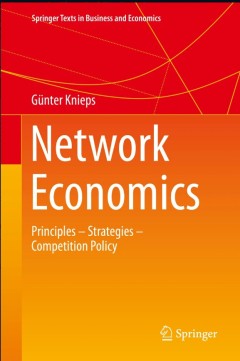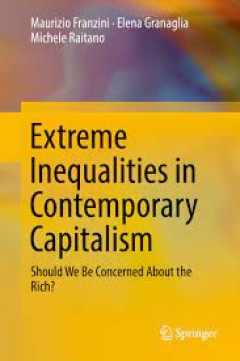Filter by

Value Economics The Ethical Implications of Value for New Economic Thinking
The last financial crisis revealed a gap between business practice and ethics. In Value Economics, Griffiths and Lucas examine some of the reasons for this ethical gap and discuss the resulting loss of confidence in the financial system. One of the reasons has been hazy or inadequate thinking about how we value economic enterprises. With the close link between the creation of value and business…
- Edition
- -
- ISBN/ISSN
- 978-1-137-54187-1
- Collation
- XV, 281
- Series Title
- -
- Call Number
- -

The Enigma of Money
The same logic also applies to such other currencies as Bitcoin and community currencies. Their recent diffusion has shown that Hayek's idea of denationalization of money and competition between multiple currencies in terms of its qualities, not its quantities sought as in ongoing quantitative easing, become more relevant under current situations. The qualities of money refer not only to stable…
- Edition
- -
- ISBN/ISSN
- 978-981-10-1819-0
- Collation
- XIV, 93
- Series Title
- -
- Call Number
- -

Economic activities under the Japanese colonial empire
The main focus of this edited volume is an examination of dynamic relationships among Japan, Taiwan, Korea, and the northeastern region of China, and the economic development of each area in East Asia from the 1910s to the end of World War II. The development of foreign trade in East Asia, the relations between industrialization and consumption in Korea, the transactions in fertilizers and the …
- Edition
- -
- ISBN/ISSN
- 9784431559276
- Collation
- -
- Series Title
- -
- Call Number
- 338.9

Economic effects of public investment : an emphasis on marshallian and moneta…
This book shows the necessity of measuring the incidence-basis indirect economic effects of public investments. The essential argument can be traced back to H. Mohring versus J. Tinbergen, the conclusions of one contradicting those of the other. Their arguments are called, respectively, "transfer" and "existing theory" of the indirect economic effect of public investments such as highways. The …
- Edition
- -
- ISBN/ISSN
- -
- Collation
- -
- Series Title
- -
- Call Number
- 338.9

Economic Impacts of Intellectual Property-Conditioned Government Incentives
This book provides new insights into the economic impacts, strategic objectives and legal structures of an emerging branch of government incentives conditioned on meeting intellectual property-related requirements. Despite becoming more common in recent years, such incentives - ranging from patent fee subsidies and patent box tax deductions to inventor remuneration schemes - are still under res…
- Edition
- -
- ISBN/ISSN
- 9789811011191
- Collation
- x, 328 pages 22 illustrations, 18 illustrations in color
- Series Title
- -
- Call Number
- 338.9

Economic Planning and Industrial Policy in the Globalizing Economy: Concepts,…
National economic planning aims at defining strategic economic objectives and priorities for a country and designing longer term policies and institutional frameworks to achieve them. Complemented in some cases by industrial policies, economic planning is a dynamic attempt to change the structure defining parameters and policy mix of an economy. In market based economies ranging from Western Eu…
- Edition
- -
- ISBN/ISSN
- 9783319064741
- Collation
- xxv, 395 pages
- Series Title
- -
- Call Number
- 338.9

The Development of BRIC and the Large Country Advantage
This book explores key questions concerning the reasons for China’s economic miracle and the rise of BRICs. It develops the concept of the Comprehensive Advantages of Large Countries (CAOLCs) and reveals the formation mechanism of CAOLCs. By analyzing the rapid rise of BRICs and the large economy phenomena, the book emphasizes the crucial role that BRICs played during and after the global fin…
- Edition
- -
- ISBN/ISSN
- 978-981-10-0633-3
- Collation
- XV, 196
- Series Title
- -
- Call Number
- -

Network Economics
This textbook on network economics provides essential microeconomic instruments for the analysis of network sectors like telecommunications, transport or energy. Network-specific characteristics emerge both on the cost side and benefit side, requiring network providers to develop innovative entrepreneurial competition strategies for costing, pricing, and investment. From a competition policy pe…
- Edition
- 1
- ISBN/ISSN
- 978-3-319-11694-5
- Collation
- XIV, 184
- Series Title
- Springer Texts in Business and Economics
- Call Number
- -

Economics of unconventional shale gas development : case studies and impacts
This book examines the economics and related impacts of unconventional shale gas development. While focusing on the Marcellus and Utica Shales in the Mid-Atlantic region, additional insights from other regions are included to provide a broader view of these issues. Shale gas development in recent years has changed the energy discussion in the US, as existing reserves of natural gas coupled with…
- Edition
- -
- ISBN/ISSN
- 9783319114996
- Collation
- -
- Series Title
- -
- Call Number
- 338.9

Extreme Inequalities in Contemporary Capitalism Should We Be Concerned About…
This book explores the mechanisms by which top incomes are achieved through work in today’s advanced economies and asks to what extent current extreme inequalities are compatible with widely held values of social justice. Reflecting on the heterogeneity of the working rich, the authors argue that very high earnings often result not from heightened competition induced by globalization but rath…
- Edition
- -
- ISBN/ISSN
- 978-3-319-28811-6
- Collation
- 13 b/w illustrations
- Series Title
- -
- Call Number
- -
 Computer Science, Information & General Works
Computer Science, Information & General Works  Philosophy & Psychology
Philosophy & Psychology  Religion
Religion  Social Sciences
Social Sciences  Language
Language  Pure Science
Pure Science  Applied Sciences
Applied Sciences  Art & Recreation
Art & Recreation  Literature
Literature  History & Geography
History & Geography